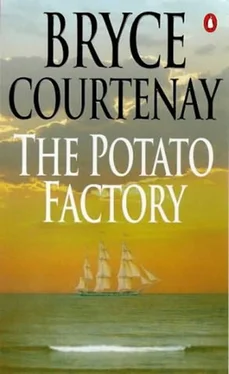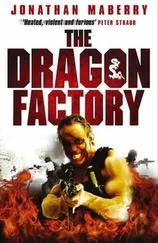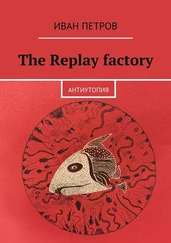Bryce Courtenay - The Potato Factory
Здесь есть возможность читать онлайн «Bryce Courtenay - The Potato Factory» весь текст электронной книги совершенно бесплатно (целиком полную версию без сокращений). В некоторых случаях можно слушать аудио, скачать через торрент в формате fb2 и присутствует краткое содержание. Жанр: Современная проза, на английском языке. Описание произведения, (предисловие) а так же отзывы посетителей доступны на портале библиотеки ЛибКат.
- Название:The Potato Factory
- Автор:
- Жанр:
- Год:неизвестен
- ISBN:нет данных
- Рейтинг книги:3 / 5. Голосов: 1
-
Избранное:Добавить в избранное
- Отзывы:
-
Ваша оценка:
- 60
- 1
- 2
- 3
- 4
- 5
The Potato Factory: краткое содержание, описание и аннотация
Предлагаем к чтению аннотацию, описание, краткое содержание или предисловие (зависит от того, что написал сам автор книги «The Potato Factory»). Если вы не нашли необходимую информацию о книге — напишите в комментариях, мы постараемся отыскать её.
The Potato Factory — читать онлайн бесплатно полную книгу (весь текст) целиком
Ниже представлен текст книги, разбитый по страницам. Система сохранения места последней прочитанной страницы, позволяет с удобством читать онлайн бесплатно книгу «The Potato Factory», без необходимости каждый раз заново искать на чём Вы остановились. Поставьте закладку, и сможете в любой момент перейти на страницу, на которой закончили чтение.
Интервал:
Закладка:
The King's Orphan School had achieved exemplary results, with most of Mary's pupils numerate and literate and some beginning to show a most gratifying propensity for learning. So impressed was Mr. Emmett, the chief clerk, that he persuaded Governor Arthur to offer Mary the position of headmistress. This independent position meant that she would no longer be under the baleful eye of the Reverend Smedley, and would be entitled to a small salary. Much to the dismay of Mary's sponsor, she had once again refused his generous offer.
'What ever shall we make of you, Mary Abacus? Will you never learn what is good for you? A more stubborn woman would be most difficult to find upon this island! If you were a man you would be quickly dismissed as a complete fool!'
Mary, who had the greatest respect for Mr Emmett, was sorry to be the cause of his disappointment. In the three years she had been teaching he had come to support her keenly and had seen to it that she was supplied with equipment from government stores, and that the Reverend Smedley did not unduly interfere with or undermine her work.
'Mr Emmett, sir, I thank you from the bottom o' me heart for the trust you have shown in me, but I must remind you, I am a teacher only for the lack o' someone more qualified. You gave me the position only because I believed the brats could take to learning.'
'I'll give you that, Mary, I'll give you that,' Mr Emmett repeated, somewhat mollified. 'You've proved us all wrong and a salutary lesson it has been, I agree.'
Mary smiled. 'You're very kind, Mr Emmett, but it be time for you to make a proper appointment. There be a widow, Mrs Emma Patterson, a free settler out from England, a Quaker I believe. She has excellent references and is well trained to her vocation. She has applied to us for a billet and she is much superior in her knowledge and methods to me or Miss Smedley.' Mary paused. 'You would do well to grant her the post in my stead.'
'Oh Mary, Mary, quite contrary, what shall we do with you?' Mr Emmett asked.
Mary grinned, thankful that he seemed reconciled to her decision. 'A reference, sir. I intend to apply for a clerking position, with some bookkeeping, just as you would have me do for the government, but in commerce. Will you grant it me?' She tilted her head and gave Emmett a most disarming smile. 'Please?'
The chief clerk tried his utmost to appear disapproving, but finally nodded his head. 'It will do you no good, my girl,' he said.
The position of headmistress of the orphan school was duly given to Mrs Patterson who, together with the patient and loving Elspeth Smedley, would ensure that the future for Mary's pupils was a bright one.
On the day before her ticket of leave was granted Mary took a tearful farewell from her orphans and cried all the way back to the Female Factory. She loved her children and had watched them grow and take pleasure in learning. Mary felt sure that some, at last, would have respectable lives. She wondered how she could possibly have given up her post, for the children loved her, gave her a purpose and had confirmed her as being a natural teacher. But deep in her heart she knew that teaching would not fulfil her ultimate ambition, that her skill with numbers and her abacus was meant for a different purpose.
With the Potato Factory, Mary had gained a further sense of business and was reminded again that the rules of supply and demand work best when they are predicated against the innate weakness of men. The brothel in Bell Alley and the supply of poteen from the Potato Factory both demonstrated this fundamental principle. To this end Ann Gower had begged that once they were free of the Female Factory they do more of the same. She also suggested they take the still with them so that they might continue in the trades that had been so lucrative for them in the prison vegetable gardens.
But Mary had resisted her friend's offer. She wanted no more of the criminal life, and was determined to be as free as the brilliant green parrots which had welcomed her to Van Diemen's Land. Freedom meant a great deal more to her than the opportunity to live a respectable existence in a new land, where old beliefs and habits were applied to circumstances which had greatly changed. She would use her freedom as though it were truly the gift of being born again to a new life. Mary's conviction that destiny had called her to something more than a life of drudgery had persisted, and she responded to it with a full heart and the unstinting application of her nimble mind. Her body had grown strong on a diet of fresh vegetables and from working in the open air, and she was ready to make whatever sacrifices were necessary.
Mary's ticket of leave included a probationary period of three years and then her sentence would be completed. She wished to use this time to learn a new trade, so she would be ready when she was permitted to go into business on her own. She would take a billet where she might learn the intricacies of trade, and her first task had been to purchase a copy of the Colonial Times so that she might peruse the advertisements for employment. The number of these which requested the need for a bookkeeper, eight in all, filled her heart with joy. But before she set about walking to each address she had a promise to keep to herself.
She had been escorted to the gates of the Female Factory by the keeper, Mr Drabble, not much past six in the morning. To Mary's surprise he had taken her hand.
'You have served your time, Mary Abacus, and I wish you well. It is my most earnest hope that you shall never return to this place.'
Mary smiled. 'Not as earnest as mine, Mr Drabble. You'll not see hide nor hair of us again!'
Mary had left without Ann Gower, who was to serve an extra week in solitary on bread and water for insubordination when drunk. Mary was somewhat relieved, for though she loved Ann she feared that she would never change, that she would always be, as the popular expression went, 'A nymph o' the pave', though such a description of Ann Gower would have been a gross underestimation of her rapidly growing size. A diet consisting largely of grog and potatoes had caused her to grow exceedingly gross, which Ann described to her customers as 'the luxury o' comfort on the ride', and she would have charged an extra sixpence if she could have gotten away with it. Mary had been reluctant to hand Ann the money she had saved on her behalf, though she told herself she could no longer be responsible for her friend. She had also given the still to her partner, to be secretly dismantled when Ann left the Factory. If Ann should show the minimum of good sense then she had the means to prosper well on the new waterfront area of Wapping.
Mary did not go directly into the town when she left the Female Factory. Carrying her bed roll, a clay pot, her abacus and a small cloth satchel, she climbed the hill immediately behind the Factory and headed towards the great mountain. Sometimes, on her way to the orphan school, she would divert into the tall trees growing on the slopes of Mount Wellington. Along a secret path of her own making she had discovered a small stream, though stream was too grand a word for the trickle of sweet, clear water which came from a large overhanging rock.
Mary now made her way to the secret rock set into the mountain side, which was flat at its top and made an ample ledge. She would sit on a carpet of moss surrounded by fern and look out beyond the shadow cast by the rock to where clumps of brilliant yellow wattle grew under the gum trees. The air around her was scented with blossom. Mountain blueberry, the berries ripe and brilliant, twisted and trailed over the smaller trees and shrubs, and every once in a while she would see a splash of wild fuchsia or a clump of pale pink and lilac early snowberries.
On hot summer days it was cool under the shelter of the rock, which was scarred with lichen and pocketed with moss. On mild winter days Mary would climb on top of the rock ledge and the sun would dapple through the leaves to warm her.
Читать дальшеИнтервал:
Закладка:
Похожие книги на «The Potato Factory»
Представляем Вашему вниманию похожие книги на «The Potato Factory» списком для выбора. Мы отобрали схожую по названию и смыслу литературу в надежде предоставить читателям больше вариантов отыскать новые, интересные, ещё непрочитанные произведения.
Обсуждение, отзывы о книге «The Potato Factory» и просто собственные мнения читателей. Оставьте ваши комментарии, напишите, что Вы думаете о произведении, его смысле или главных героях. Укажите что конкретно понравилось, а что нет, и почему Вы так считаете.












